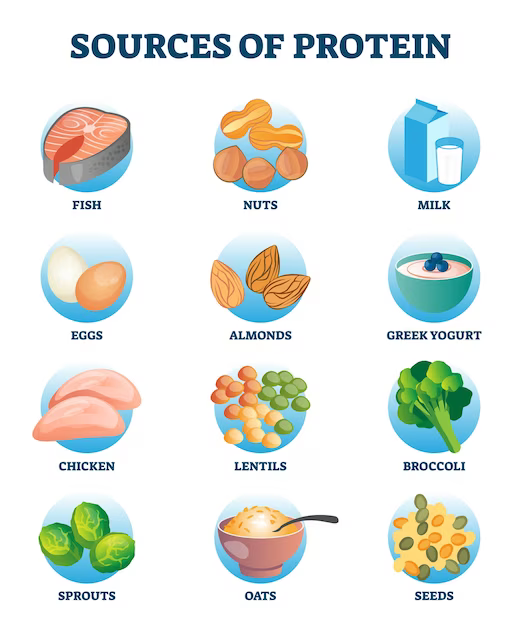The Ultimate Guide to High-Protein Foods: Boost Your Health and Vitality
Introduction
Getting enough protein in your diet is crucial for maintaining overall health and well-being. Proteins are the building blocks of our body, supporting cell growth, repair, and various bodily functions. Including protein-rich foods in your meals can provide numerous benefits, such as muscle growth, increased satiety, and improved immune function. In this comprehensive guide, we will explore the best sources of high-quality protein, their nutritional benefits, and how to incorporate them into your daily diet.
Why Protein Matters
Protein plays a vital role in our bodies, serving as the foundation for various tissues and organs. It is composed of amino acids, some of which our bodies can produce on their own (nonessential amino acids), while others must be obtained from our diet (essential amino acids). These essential amino acids are crucial for normal bodily functions, making it important to consume protein-rich foods regularly.
Protein offers several key benefits:
- Muscle Growth and Repair: Protein is essential for building and repairing muscle tissue, making it crucial for athletes and those looking to gain muscle mass.
- Satiety and Weight Management: Protein-rich foods can help you feel fuller for longer, reducing cravings and supporting weight management efforts.
- Immune System Support: Proteins play a vital role in supporting a healthy immune system, helping to defend against infections and promote overall wellness.
High-Protein Animal Sources
Animal sources of protein are typically considered complete proteins, meaning they provide all essential amino acids in adequate amounts. These sources include lean meats, poultry, fish, eggs, and dairy products. Let’s explore some of the best high-protein animal sources:
Lean Meats
Lean meats, such as chicken breast, turkey, and lean cuts of beef, are excellent sources of high-quality protein. They provide essential amino acids, along with important nutrients like iron and zinc. Opt for lean cuts to minimize saturated fat intake and support heart health.
Fish and Seafood
Fish and seafood are not only rich in protein but also provide essential omega-3 fatty acids, which have numerous health benefits. Fatty fish like salmon, tuna, and mackerel are particularly high in protein and omega-3s, supporting heart health and brain function.
Eggs
Eggs are a nutritional powerhouse, offering a complete protein source along with vitamins, minerals, and healthy fats. They are versatile and can be enjoyed in various ways, such as boiled, scrambled, or incorporated into recipes.
Dairy Products
Dairy products like milk, yogurt, and cheese are excellent sources of protein, calcium, and other essential nutrients. Greek yogurt, in particular, stands out for its high protein content and additional benefits like probiotics, which support gut health.
Plant-Based Protein Sources
For those following a vegetarian or vegan diet, there are plenty of plant-based protein sources available. While some plant-based proteins may not provide all essential amino acids, combining different sources throughout the day can ensure you meet your protein needs. Let’s explore some of the best plant-based protein sources:
Legumes and Pulses
Legumes and pulses, such as lentils, chickpeas, and black beans, are packed with protein, fiber, and other essential nutrients. They are versatile ingredients that can be used in soups, stews, salads, and even plant-based burgers.
Quinoa
Quinoa is a unique plant-based protein source as it contains all nine essential amino acids, making it a complete protein. It is also rich in fiber, vitamins, and minerals, making it a nutritious addition to any meal.
Nuts and Seeds
Nuts and seeds, including almonds, walnuts, chia seeds, and hemp seeds, provide protein, healthy fats, and various vitamins and minerals. They can be enjoyed as snacks, added to smoothies, or used as toppings for salads and yogurt.
Soy Products
Soy products, such as tofu, tempeh, and edamame, are popular plant-based protein sources. They are rich in protein, fiber, and antioxidants, making them a nutritious choice for vegetarians and vegans.
How Much Protein Do You Need?
The recommended daily protein intake varies depending on factors such as age, sex, activity level, and overall health. As a general guideline, most healthy adults require around 0.8 grams of protein per kilogram of body weight. However, individual needs may vary, and certain populations, such as athletes or older adults, may require higher protein intakes for optimal health.
Incorporating High-Protein Foods into Your Diet
Now that you understand the importance of protein and know some of the best sources, it’s time to incorporate them into your daily diet. Here are some practical tips:
- Include Protein-Rich Foods in Each Meal: Aim to have a source of protein, whether animal or plant-based, with each meal. This could be a piece of grilled chicken, a serving of lentils, or a scoop of Greek yogurt.
- Snack on Protein: Choose protein-rich snacks to keep you satisfied and energized between meals. Options include nuts, Greek yogurt, hard-boiled eggs, or protein bars made with natural ingredients.
- Experiment with Plant-Based Proteins: If you follow a vegetarian or vegan diet, explore different plant-based protein sources like tofu, tempeh, and quinoa. Get creative with recipes to discover new flavors and textures.
- Meal Prep and Planning: Plan your meals in advance, incorporating protein-rich ingredients. This will ensure you have balanced and nutritious meals readily available, even on busy days.
- Combine Protein Sources: If you’re consuming plant-based proteins, combine different sources throughout the day to ensure you’re getting all essential amino acids. For example, pairing beans with rice or lentils with quinoa creates a complete protein source.
Conclusion
Protein is an essential nutrient that plays a critical role in supporting overall health and vitality. Whether you choose animal or plant-based sources, including protein-rich foods in your diet is essential for muscle growth, satiety, and immune function. By incorporating lean meats, fish, eggs, legumes, and other high-protein foods into your meals, you can optimize your nutrition and reap the benefits of a well-rounded diet. So, make protein a priority, and fuel your body with the building blocks it needs to thrive.
Remember, consult with a healthcare professional or registered dietitian before making any significant changes to your diet or if you have specific dietary requirements or health concerns.





